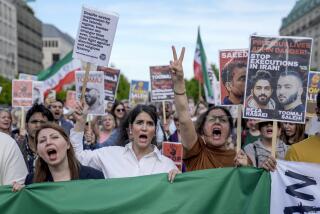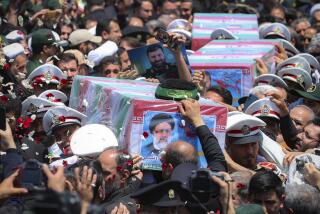Hundreds Pay Respects at Service : Iranian Who Set Himself Afire Interred
- Share via
The unfamiliar strains of Persian ballads echoed through the hills of Forest Lawn Memorial Park on Saturday as Neusha Farrahi was buried in a plot between slopes named Immortality and the Mystery of Life.
Farrahi, 31, set himself on fire Sept. 20 in a protest at the Federal Building in Westwood. He died last week. The purpose of his sacrifice, he wrote, was to awaken Iranians and Americans to what he called the “barbaric” regime of the Ayatollah Ruhollah Khomeini.
The funeral, a three-hour graveside service in Farsi, was attended by hundreds of Iranian exiles who bore red carnations and roses symbolizing life. If Farrahi’s message reached non-Persian Americans, it appeared they did not attend the funeral.
His self-immolation is one of the most controversial events in the history of the estimated 200,000 to 400,000 people in the Iranian exile community here. To many, he is a martyr. To some conservative monarchists who blame leftists like him for overthrowing the Shah of Iran in 1979, Farrahi was a “showoff.”
Yet his action touched even political opponents.
“I did not know him,” building contractor Mohammed Baheri said. “But I am Iranian. That’s why I am here. I am not of his political beliefs. But I would stand here with respect for anyone who did this.”
Baheri said he fled Khomeini’s Islamic Republic three years ago with his family after his daughter refused to robe herself in the heavy robes required of women under the Islamic regime, and was forced to stand against a wall to be publicly harassed.
According to Amnesty International, Khomeini has acknowledged executing 6,000 people since 1979, most of them political opponents, Kurdish and other minorities, and women adulterers. The real figures could be much higher, the international human rights organization said. Farrahi himself co-edited a book on human rights abuses under Khomeini.
‘Echoes All Our Anguish’
Two of those executed were the sons of Monir Nahid, a Kurdish woman in black who sobbed as Farrahi was eulogized.
“I had so many dreams for my sons,” she said. “And Khomeini executed them in 1979 with no charges, except being Kurdish. This, what Neusha Farrahi has done, is the voice of all our exiles. He echoes all our anguish.”
Farrahi’s mother, Galoria, wore white as she stood by her husband during the emotional service. “Neusha did not believe in wearing black,” she said. “I wear white because it is a symbol of peace and my son is a symbol of peace.”
Her husband, Farhang, a renowned Iranian journalist, sobbed over his eldest son’s grave, and shouted into mounds of red carnations: “Neusha, I give you my pledge to continue this struggle for the liberation of Iran.”
More to Read
Sign up for Essential California
The most important California stories and recommendations in your inbox every morning.
You may occasionally receive promotional content from the Los Angeles Times.













